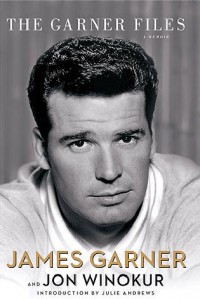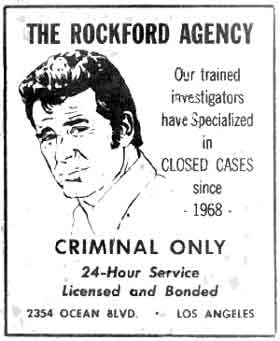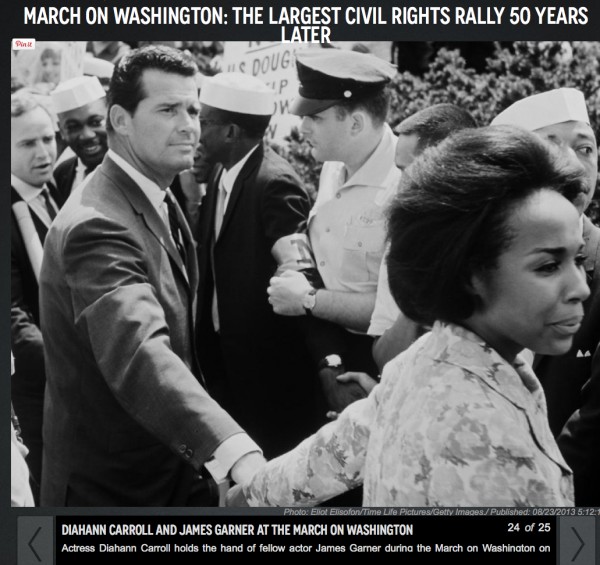[via NEW YORK DAILY NEWS]
WASHINGTON POST: When actor James Garner decided to help organize and attend the March on Washington in 1963, he wasn’t just listening to his conscience. He and other actors who attended may have been embarkingon Hollywood’s first large-scale political act since the days of McCarthyism and Hollywood’s anti-Communist blacklist.After years of viewing the government with suspicion, many felt emboldened to participate, joining forces with black actors such as Harry Belafonte, Ruby Dee and Diahann Carroll. Garner and other celebrities in attendance, including Paul Newman and Marlon Brando, openly defied J. Edgar Hoover and the Federal Bureau of Investigation, which was keen to stop the march. In “Nobody Turn Me Around: A People’s History of the 1963 March on Washington,” Charles Euchner wrote:
The FBI attempted to exploit fears about violence and Communist infiltration of the civil rights movement — fears that were partly the result of J. Edgar Hoover’s long campaign against the movement. FBI agents made last-minute calls to celebrities. Do you know, the agents asked, that many of the march’s leaders are Communists? Do you know that Communists and other leftists could create chaos at the march? Do you know that it’s not too late to pull out of the march? Stay away! MORE
LOS ANGELES TIMES: With a thick head of hair and a Cary Grant cleft chin, Garner, who died Saturday at age 86, was in many ways a more approachable and easygoing version of the tall,  Rdark, midcentury leading man — Rock Hudson come down to Earth (as Hudson himself eventually would). Indeed, he played twice opposite Doris Day, in “Move Over, Darling” and “The Thrill of It All” (both from 1963), only one film fewer than did Hudson. Garner had the authority of a person who put no stock in his authority, and the air of not taking life too seriously, which is perhaps why drama — which he could play, and often did — is not what we’ll remember him for. He was not made for tragedy, really, but to bounce back, like a punching-bag clown; many of his straight roles have more than a little comedy in them. (“Rockford” was comedy flat out.) Nor was he fashioned for villainy; there was too much goodness in him. MORE
Rdark, midcentury leading man — Rock Hudson come down to Earth (as Hudson himself eventually would). Indeed, he played twice opposite Doris Day, in “Move Over, Darling” and “The Thrill of It All” (both from 1963), only one film fewer than did Hudson. Garner had the authority of a person who put no stock in his authority, and the air of not taking life too seriously, which is perhaps why drama — which he could play, and often did — is not what we’ll remember him for. He was not made for tragedy, really, but to bounce back, like a punching-bag clown; many of his straight roles have more than a little comedy in them. (“Rockford” was comedy flat out.) Nor was he fashioned for villainy; there was too much goodness in him. MORE
TIME: James Garner’s most famous role, as Jim Rockford in The Rockford Files in 1974, was the perfect meeting of Garner’s talents and the spirit of the age. Like Bret Maverick, Rockford was a screen-hero archetype who became all the bigger for being cut down to size: a private detective who’d spent time in jail on a bad rap, always one step ahead of the bill collectors and one good night’s sleep shy of his peak. He was not a pressed suit; he was a rumpled jacket that could use a dry cleaning. And that was what made him wear so comfortably. The Rockford Files was a crime show where the characters were finally more important than the action: it had its share of brawls and car spinouts, but you really tuned in for the ping-pong dialogue between Rockford and con man Angel or his dad Rocky. (It was a precursor of the more character-based dramas of today’s cable-dominated TV era, and in fact the show was one of the first writing jobs  for David Chase of The Sopranos.) Rockford might get his man in the end, but what made him loveable was less his triumphs than his ability to roll with defeat. He could throw a punch if he had to, but what made him a hero was his ability to take one. MORE
for David Chase of The Sopranos.) Rockford might get his man in the end, but what made him loveable was less his triumphs than his ability to roll with defeat. He could throw a punch if he had to, but what made him a hero was his ability to take one. MORE
NEW YORK TIMES: “Maverick” had been in part a sendup of the conventional western drama, and “The Rockford Files” similarly made fun of the standard television detective, the man’s man who upholds law and order and has everything under control. A sucker for a pretty girl and with a distinctly ‘70s fashion sense — he favored loud houndstooth jackets — Rockford was perpetually wandering into threatening situations in which he ended up pursued by criminal goons or corrupt cops. He tried, mostly successfully, to steer clear of using guns; instead, a bit of a con artist himself, he relied on impersonations and other ruses — and high-speed driving skills.
Every episode of the show, which ran from 1974 to 1980 and more often than not involved at least one car chase and Rockford’s getting beaten up a time or two, began with a distinctive theme song featuring a synthesizer and a blues harmonica and a message coming in on a newfangled gadget — Rockford’s telephone answering machine — that underscored his unheroic existence: “Jim, this is Norma at the market. It bounced. Do you want us to tear it up, send it back or put it with the others?” MORE
JAMES GARNER: I started smoking marijuana in my late teens. I drank to get drunk but ultimately didn’t like the effect. Not so with grass. Grass is smooth. It had the opposite effect from alcohol: it made me more tolerant and forgiving. … “I smoked marijuana for 50 years. I don’t know where I’d be without it. It opened my mind to a lot of things, and now it’s active ingredient, THC, relaxes me and eases my arthritis pain. I’ve concluded that marijuana should be legal and alcohol should be illegal. But, good luck with that. MORE

